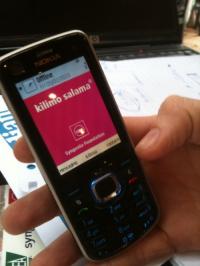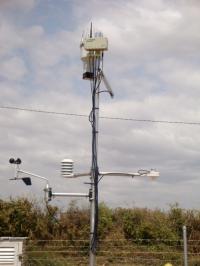Microinsurance plan uses mobile phones, weather stations to shield Kenya farmers
- Friday, March 5, 2010, 23:09
- Latest News
- Add a comment
March 5, 2010: As East Africa recovers from the worst drought in decades, an innovative program launched on Friday will use a low-cost, mobile phone payment and data system, and automated, solar powered weather stations, to offer thousands of farmers in parts of Western and Central Kenya affordable, “pay as you plant” insurance to protect their investments in desperately needed high-yielding seeds, fertilizers, as well as other farm inputs.
The program, called “Kilimo Salama,” which in Kiswahili means “safe farming,” is a partnership between the Syngenta Foundation for Sustainable Agriculture, UAP Insurance, and telecoms operator Safaricom. The project will offer farmers who plant on as little as one acre insurance policies to shield them from significant financial losses when drought or excess rain are expected to wreak havoc on their harvests.
“Extreme weather, particularly drought, traps many African farmers in poverty because it robs them of the means to recover,” said Marco Ferroni, Executive Director of the Syngenta Foundation. “We have in Kilimo Salama a micro-insurance strategy that will work. By utilizing state-of-the-art risk management tools, revolutionary mobile phone technologies, and the knowledge and expertise of farmers and rural business men and women, we have developed for the first time a model for providing farmers with reliable, low-cost cover from the vagaries of extreme weather.”
The program will offer farmers the option of insuring purchases of seed, fertilizer, and other inputs from agricultural companies that are part of the Kilimo Salama partnership.
“We believe Kilimo Salama can revolutionize insurance and make it accessible to farmers,” said James Wambugu, Executive Director of UAP. “By using the weather stations to verify local weather conditions, we are avoiding claims procedures that have created mistrust and led people to avoid insurance. As such, this strategy has the potential to make agricultural micro-insurance affordable and attractive for smallholder farmers and economically viable for insurance companies in developing countries that had previously written off the agricultural sector.”
Through Kilimo Salama, farmers can minimize risk by paying an extra 5% for a bag of seed, fertilizer or other inputs from participating local agro-dealers. That translates to about nine Kenyan shillings (Kshs) to insure a one-kilogram bag of improved, higher-yielding maize seed, and 25 Kshs to insure a 10-kilogram bag of fertilizer. The agro companies participating in the program, MEA Fertilizers and Syngenta East Africa Limited, match the farmers’ investment to cover the full 10 percent premium it takes to cover the cost of the program. The project partners hope to expand the program to include other agribusiness companies in the upcoming years.
Agro-dealers registered and trained by Kilimo Salama have been equipped with a camera phone that scans a special bar code at the time of purchase, which immediately registers the policy with UAP Insurance over the Safaricom’s mobile data network. This innovative mobile phone application, which was developed by the Syngenta Foundation, then sends a text (SMS) message confirming the insurance policy to the farmer’s mobile phone. Some 30 weather stations in the targeted regions have been renovated with automated, solar-powered systems capable of broadcasting regular updates on weather conditions and rainfall quantities. When data transmitted over Safaricom’s 3G data network from a particular station indicates that drought or other extreme conditions (including excessive rains) are destined to cripple crops, all farmers registered with that station automatically receive payouts directly via Safaricom’s M-PESA mobile money transfer service.
“This is the first project to use mobile phones to set up insurance contracts and issue payouts to poor, smallholder farmers in Africa, deploying both our vast data infrastructure and globally acclaimed M-PESA service,” said Betty Mwangi, Chief Officer, New Products Division at Safaricom. The project was pilot-tested in 2009 in the Laikipia district, where 200 farmers purchased insurance for seeds and herbicides, and, after the drought, received compensation for 80 percent of their investment.
While microfinance has taken off in many poor countries, micro-insurance, particularly for agriculture, has largely failed to take off because it offered no immediate benefit to farmers. As a result, farmers showed little interest.
The Kilimo Salama initiative seeks to overcome these obstacles by employing a variety of innovations.
First, payouts are triggered by a relatively inexpensive index system tied to local weather conditions. The weather stations, which are generally located at schools, private farms or other secure locations, allow experts to determine when the situation in a particular area has deteriorated to the point that crops are no longer viable. Costs are further reduced by using the Safaricom data network to record policies and transfer funds, both the premiums to UAP and the payouts to farmers. The cost of each transaction is minimal—far less than the price of a SMS message.
In addition, the system is designed to build trust by allowing farmers to purchase policies for relatively little cash out-of-pocket and on a “pay as you plant” basis. And by partnering with agricultural companies that sponsor premiums, organizers have been able to avoid dependence on government subsidies.
“Also, payouts go directly to farmers, not to a middleman or a loan provider,” added Ferroni. Officials at UAP and Syngenta say evidence from the pilot program makes them optimistic that the program can be widely successful.
© 2010, Microfinance News. All rights reserved. 2008-09
Write a Comment
Gravatars are small images that can show your personality. You can get your gravatar for free today!











